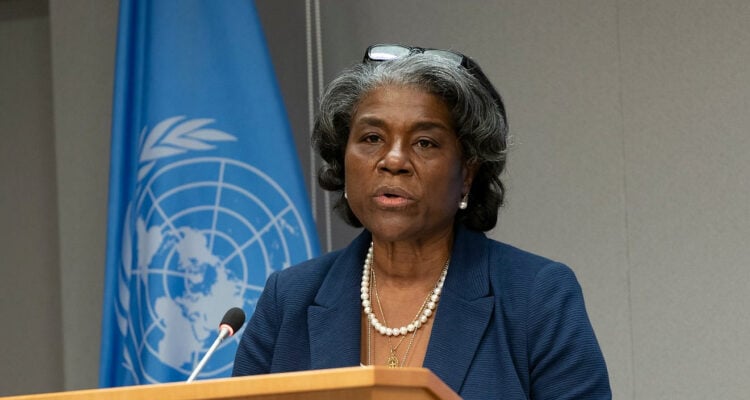Thomas-Greenfield also took Israel to task on Tuesday for Israeli Finance Minister Bezalel Smotrich’s recent decision to withhold Palestinian Authority tax revenue.
By Mike Wagenheim, JNS
U.S. Ambassador to the United Nations Linda Thomas-Greenfield on Tuesday called out the expansion of Jewish neighborhoods in Judea and Samaria as “an obstacle to the achievement of a two-state solution—the end state we all want to see.”
Speaking at the monthly U.N. Security Council meeting on the Israeli-Palestinian file, Thomas-Greenfield said the expansions were “inconsistent with international law,” which “only serves to weaken Israeli security.”
The council also “cannot ignore” the record number of Palestinians killed in Judea and Samaria in 2023, or the “significant uptick in deadly” violence by “settlers,” she added.
Calling on Israeli authorities to contain attacks by Jewish residents of Judea and Samaria, Thomas-Greenfield drew attention to the recent sanctioning Israeli protest movement Tzav 9.
The U.S. State Department called Tzav 9 “a violent extremist Israeli group that has been blocking, harassing and damaging convoys carrying lifesaving humanitarian assistance to Palestinian civilians in Gaza.”
Tzav 9 has denied attacking aid convoys, insisting their activity is peaceful.
“We have been relating to the blockade peacefully, using our right to free speech to protest against the hijacking of humanitarian aid by Hamas. We deplore the torching of the trucks and the violence,” Tzav 9 spokesperson Rachel Touitou told JNS on Sunday.
Thomas-Greenfield also took Israel to task on Tuesday for Israeli Finance Minister Bezalel Smotrich’s recent decision to withhold Palestinian Authority tax revenue.
On May 22, Smotrich called for a series of punitive steps against the P.A. in response to Ramallah’s push for unilateral statehood and support for the International Criminal Court case against the Jewish state, which he called “diplomatic terrorism.”
In a letter to Prime Minister Benjamin Netanyahu, the finance minister announced his intention to immediately halt the transfer of all monthly tax revenues that Jerusalem collects on behalf of the P.A.
Thomas-Greenfield urged support for Ramallah, saying that “Israel and Palestinians need to have faith in the Palestinian Authority’s ability to govern as a non-corrupt, faithful actor working in the interest of the Palestinian people. It is essential, therefore, that the Palestinian Authority work to reform itself, and that it do so as quickly as possible.”
Washington wants a reformed P.A. to take control of the Gaza Strip after the war against Hamas ends, a move that Israel vehemently rejects due to Ramallah’s overt support for terrorism.
During her remarks to the Security Council on Tuesday, Thomas-Greenfield condemned Hamas for its rejection of an Israeli-proposed, Security Council-endorsed multi-phased ceasefire deal.
“Unfortunately, Hamas has eschewed the calls from this council, and ignored voices from across the international community,” she said. “In fact, rather than accept the deal, Hamas has added even more conditions.”
From Washington’s perspective, “It’s time to end the intransigence from Hamas, start a ceasefire and release the hostages,” she said.
Israel’s deputy U.N. envoy Jonathan Miller told the Security Council that while Israel remains “committed” to the ceasefire agreement, “Hamas’ refusal to release the hostages through diplomacy proves that the efforts to bring our hostages home must also include military means.”
He cited the recent rescue by Israeli security forces of four hostages, saying, “We will continue until the last remaining hostages are returned, and we will not stop until Hamas’s military and governing capabilities are dismantled.”
Miller pushed back on claims of Thomas-Greenfield and other council members that Israel must do more to facilitate aid delivery in Gaza, putting the onus on the United Nations to clear a massive backlog of deliveries which Israel has already screened.
“Nearly all United Nations requests for the coordination of humanitarian convoys have been and are being approved, and the daily pauses in operations against terrorists continue to enable the distribution of aid,” said Miller.
“Yet, Hamas continues to attack aid convoys serving their dual objectives of stealing food and supplies for terrorist combatants, while disrupting the delivery of aid,” he added, citing a June 14 Hamas rocket attack on Israel from inside a central Gazan humanitarian area.
“Where was the council’s outrage at this?” he said.





